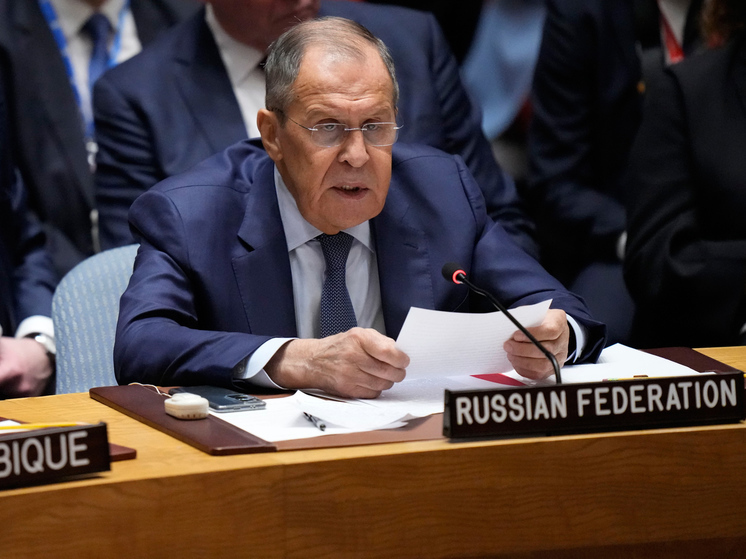Unconventional methods of Russian diplomacy
Cobblestone is a weapon of the proletariat, and brick is a weapon of modern Russian diplomacy. Such unexpected conclusions can be drawn following the meeting of the foreign ministers of the BRICS bloc in New York on the sidelines of the UN General Assembly.
And no, Sergei Lavrov did not literally throw bricks at his Western colleagues (although I think he can do that if necessary). The source of my inspiration is the absolute coincidence of the sound of two English words: bricks (bricks) and BRICS (geopolitical unification). And so it happened: communication with BRICS colleagues armed the head of the Russian Ministry of Foreign Affairs with a heavy brick.

As a result of the action, Sergei Lavrov’s department released a statement with as many as thirty points. But all the “salt” is contained in only two of them. The final chord of the document (item number 30): “The ministers were informed about the progress of preparations for Russia’s upcoming chairmanship of BRICS in 2024. Brazil, India, China and South Africa have expressed their full support for Russia's BRICS chairmanship…
Ministers also look forward to holding a full meeting of the BRICS foreign ministers/international relations in Russia in 2024.
“Ministers are awaiting a ministerial meeting” does not sound particularly elegant. But the issue here is not the elegance of style, but the notorious battle for the sympathy of the Global South and the West's ongoing attempts to isolate Russia.
I don’t know what else BRICS is useful for (this structure remains painfully amorphous), but in terms of countering the West’s attempts to build a political cordon sanitaire around Russia, this bloc has now turned out to be a real lifesaver for Moscow.
Next year, BRICS will become a much larger organization. Its members will include Argentina, Egypt, Iran, the United Arab Emirates, Saudi Arabia and Ethiopia. And the foreign ministers of all these states will also appear en masse in Russia next year, and not to offer their mediation on Ukraine, but simply to talk about life and the realities of modern international relations.
It is not at all a fact that this “talk about life” will bring concrete benefits to Russia. But the image gain is guaranteed — to spite Zelensky and the collective West.
Another “our response to Chamberlain” (or, in modern political realities, to Biden) is contained in paragraph 7 of the statement: “Ministers supported comprehensive reform of the UN, including its Security Council… and supported the legitimate aspirations of developing countries in Africa, Asia and Latin America, including Brazil, India and South Africa to play a greater role in international affairs, particularly in the United Nations, including its Security Council.»
Let's learn to read diplomatic jargon correctly: from the point of view of ordinary language norms, the word “including” is clearly superfluous here. Brazil, India and South Africa — it is precisely these BRICS colleagues that Moscow is ready to push “through pull” into the most elite political club on earth — among the permanent members of the UN Security Council.
The topic of reform of the UN Security Council is now extremely fashionable . Both Zelensky, who proposed depriving Moscow of the right to veto decisions of the Security Council, and Biden, who took the initiative to expand the number of permanent members of the UN Security Council, are actively trying to use it against Russia.
The idea of an official Kyiv is currently a deliberate failure. Even the head of the German Foreign Ministry, Bärbock, who ardently hated Russia, did not support her. But Biden’s plan had to be neutralized. To come out completely against Security Council reform is to turn against the Global South, which has long been insisting on raising its own status.
Therefore, Moscow rolled out its own version of the reform. They say that we do not want to see countries like Germany and Japan that are unfriendly in our eyes in the Security Council. But friends from Brazil, India and South Africa are welcome!
For the West, such an approach, of course, will be unacceptable. And with a high degree of probability, the current status quo, which is extremely beneficial for Russia, will be maintained in the UN Security Council. But at the same time, the Global South will have no reason to be offended by Moscow.
Both the Security Council is intact, and friends have no complaints! Beauty! Of course, this “beauty” does not bring Moscow any closer to solving its main current task — the speedy end of the Ukrainian crisis on terms acceptable to the Kremlin. But the solution to this problem no longer depends on Lavrov’s “bricks”. This requires something very heavy.


